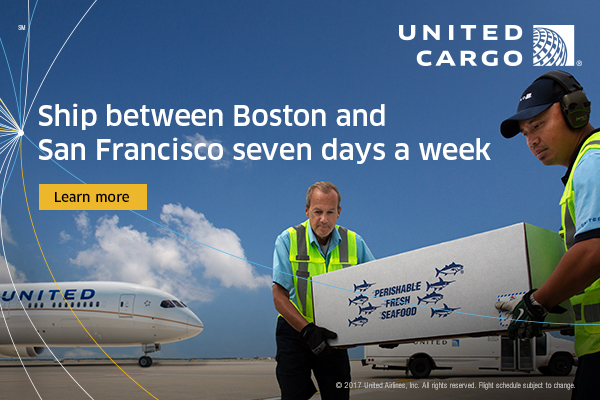
 |
 |
 #INTHEAIREVERYWHERE |
| Vol. 16 No. 100 | Friday
December 29, 2017 |
 |
|
The lack of winter season slots at AMS forced many cargo airlines to find alternative airports and highlighted the glaring lack of global airport capacity. In the first part of this special FlyingTypers series, the European Shippers’ Council called for reform of IATA’s 80:20 slot guidelines. In part two, FlyingTypers speaks to Lara Maughan, Head of Worldwide Airport Slots. Making The Case All-cargo airlines have the opportunity to press their case for more leeway when it comes to slot allocations but making changes to ‘80:20’ guidelines will be difficult, according to IATA. The 80/20 Rule IATA’s ‘use
it or lose’ 80:20 formulation is part of the Worldwide Slot Guidelines
(WSG) used to allocate capacity at leading airports globally. These state
that if an airline uses at least 80 percent of its allocated slots it
assumes historic rights to the slots for the next season. How About 70/30? As
previously reported, a global shortage of slot capacity has hit the
headlines recently, primarily due to the loss of slots experienced by
freighter operators at AMS, which has seen multiple services diverted
to secondary European airports. Maughan & Change: Long & Winding Road But according to Lara
Maughan, Head of Worldwide Airport Slots IATA, making changes to WSG is
a long and difficult process. WSG, she said, was the foundation upon which
the global slot allocation process was built and it was designed to benefit
airlines, airports, and passengers by optimizing the use of scarce airport
capacity. Insuring Access View S/H Maughan insisted the guidelines
ensured slots at capacity-constrained airports around the world were allocated
to airlines using consistent policies, principles, and processes and were
reviewed on a regular basis to keep up with regulatory changes. No 10 Percent Solution While reluctant to comment
on whether leisure airlines will squeeze cargo operators out of major
hubs such as AMS in the future, as shippers allege, she said IATA’s
analysis of a move to a 70:30 split on historic slot allocation had shown
this would not yield the extra leeway cargo airlines sought. One For All “It’s very
difficult to meet demand at the moment due to a lack of capacity and I
think as an industry we focus our attention on creating more capacity
for all.” Other Voices However, while FlyingTypers
learned that at least two integrators including DHL are participating
in the current review, neither Maughan or IATA’s communications
department were able to provide any information about how other cargo
airlines or freight supply stakeholders could participate, or when the
current review would be concluded. Brexit Speculation Weighs In Asked how Britain’s
decision to leave the EU might affect its implementation of WSG, Maughan
replied: |
 |
 |
 |
When
I was a little boy, my Mom said I had to go church to realize that something
bigger than ordinary human beings made this earth. The Butter Cake Connection Looking back over the decades, the thing that initially drew me to the Episcopalians was far more mortal in design. Glorious old German bakeries dotted the path of my weekly walk along Metropolitan Avenue to and from church every Sunday. A Great Pastor The bakeries, and even
more so the kind pastor that taught me the bible for one hour a week in
a small room above the church, brought me to religion. Even today, 60-plus
years later, those days in St. Luke’s small room above the narthex,
talking things over in great detail with Rev. Thomas Blomquist, still
burn bright in my memory. Praise To The Butter Cake
End Of An Era Today, alas, everybody
is gone, and so are the old German bakeries. The Discovery And then at around age
60, I discovered the motherload—an authentic butter cake in a place
called The Oxford Bake Shop on Liberty Avenue in Queens, New York, about
three blocks away from the old Crossbay Movie Theater on Woodhaven Blvd. |
 |
Dees', a plant and flower nursery, is an
old time, family business that has been located just off the main runways
at John F. Kennedy International Airport in Oceanside, New York since
1958. |
 |
If
You Missed Any Of The Previous 3 Issues Of FlyingTypers Access complete issue by clicking on issue icon or Access specific articles by clicking on article title |
||
 Vol. 16 No. 97 Blockbuster CNS PayCargo Chuckles For December 8, 2017 Cargo C'est Magnifique Delhi To Go January Summit Lest We Forget Super Moon |
 Vol. 16 No. 98 Always Positive Uplifting World of TIA Chuckles for December 15, 2017 Delta Expanding CEIV Remembering Richard |
|
Publisher-Geoffrey
Arend • Managing Editor-Flossie Arend Film Editor-Ralph Arend • Special Assignments-Sabiha Arend, Emily Arend • Advertising Sales-Judy Miller |
|